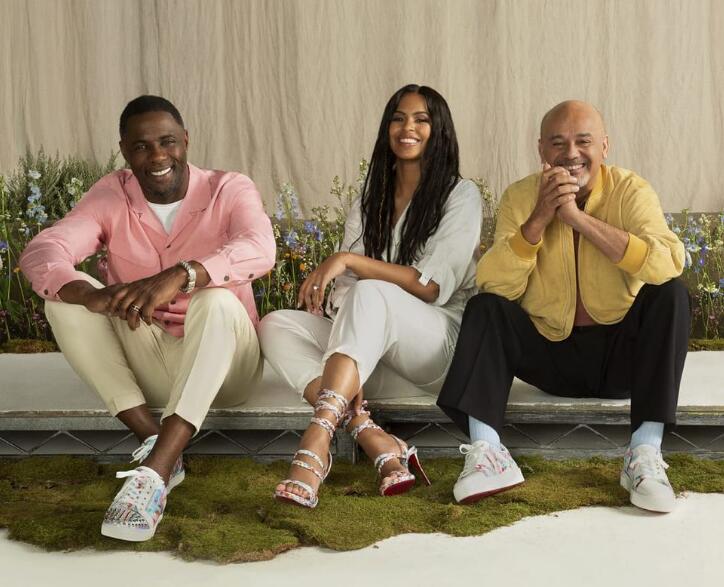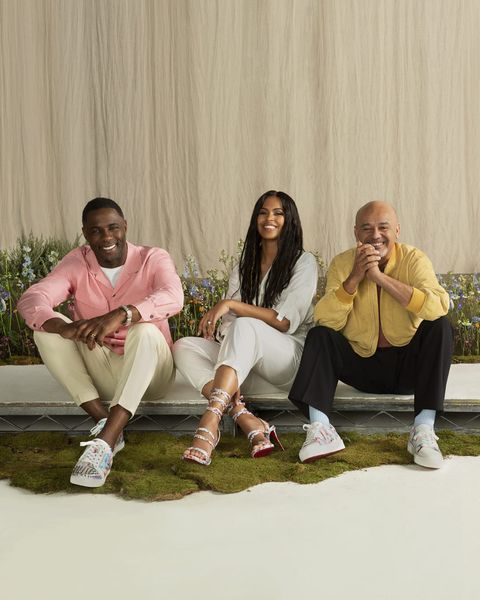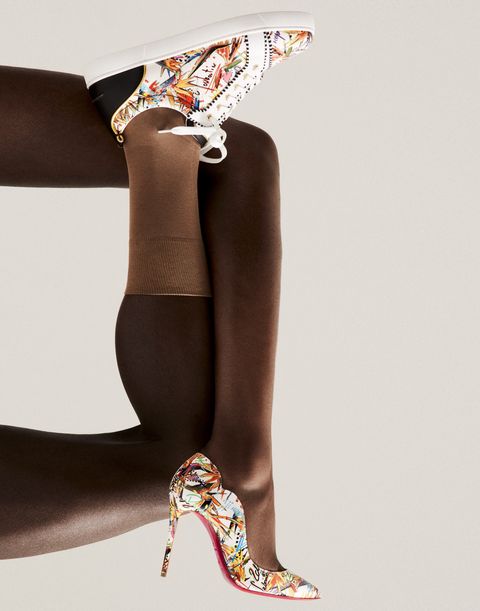The fight for racial equality and social harmony is ongoing, but in the eyes of actor Idris Elba and his wife, Sabrina Elba, there is always hope. The pair collaborated for the second time on a collection with their longtime friend and legendary designer Christian Louboutin titled Walk a Mile in My Shoes.
While their first collection was born from a unanimous feeling of anxiety, anger, and sadness over the country’s racially charged hate crimes, this one came from a place of joy and positivity for the progress we’ve made and the change that is to come.
ADAMA JALLOH
The capsule collection includes shoes printed with handmade illustrations featuring national flowers that symbolize the Elbas’ cultures: the protea flower of Somalia (where Sabrina’s family is from), the cotton tree of Sierra Leone, and the desert rose of Ghana (both places where Idris has roots).
“In the first one, at the time that we started, we were angry,” Sabrina says. “I think everyone was a little bit angry and felt like something needed to be done and some change needed to be made, and it brought us together to create something beautiful, but it was inspired a little bit by frustration. And I think for this one, it’s so great to be able to celebrate not only the success of the first collection, but also feeling like there’s been a little bit of progress.”
All proceeds from the collection, which launched June 15, will go to six grassroots organizations from around the world chosen by the designer and the Elbas, related to education, the arts, and youth empowerment. They are as follows: AfriKids, an organization that protects children in northern Ghana; Elman Peace Centre, Somalia’s first community-based disarmament and reintegration program for youth being co-opted into armed groups; The Raining Season, which provides resources for vulnerable and orphaned children, as well as impoverished families in Sierra Leone; CASA 93, a fashion school in Brazil that offers free education to teens with few resources;Brooks Sneakers Immediate Theatre, which involves London’s communities in creative projects that inspire well-being and positive change; and Art Start, a U.S.-based organization that uses the creative process to nurture the voices, hearts, and minds of historically marginalized youth.
With their first collection, which launched in 2021, the trio raised almost $2 million.
“It’s important to give what you can how you can. Everyone can do something,” Sabrina says. “I feel like there has been a trend and a bit of performative activism, unfortunately, so I think what this collection is doing is hopefully setting a bar—it’s not just about righting a tweet, you really need to put the work in.”
Idris agrees. “I think there’s definitely a consciousness among people that have the platform to say, ‘You know what? We’re privileged, we have this opportunity, let’s do something about it,'” he says.
Sabrina and Idris—”a secret sneaker drawer” who used to sketch out shoe designs as a kid—created two original styles for the collection inspired by their backgrounds. The colorful Maryam wrap sandal (which is also offered in a heel version) is a tribute to Sabrina’s mother and Somalian heritage, while the chunky white 2002SL sneaker (which also comes with a painterly red and blue Celebration print on the sides) is named after Idris’s country of origin and his daughter Isan’s date of birth.
“I think from a design perspective, we wanted to be positive and shed some light on what we’ve done and what we’ve achieved. This felt more celebratory and not from a place of darkness,” Idris tells BAZAAR. “We continued to work with classic Christian Louboutin silhouettes and offered two from-scratch designs that we’re very proud of—a little bit of an expansion of the first collection—and we thought about summer, we thought about the colors, we thought that we still want people to feel that genuine consumer consciousness of, ‘Hey, I would like to contribute,’ Hoka One One while at the same time wearing something that makes them feel good.”
This time around, the duo, along with Louboutin’s talented design team, reincorporated the flower motif they introduced in their first collection in a very different way. The first designs showcased the yellow strelitzia, known as the “freedom flower,” which from the side can look like a bird taking flight. Sabrina says it was meant to represent “the struggle of the time.” But the Season II florals, while still “rooted” the way Idris says the collection “is rooted in the struggle,” are sunny and cheerful with the hope of better days.
“I think Black Lives Matter, the conversations around race, and the inequality that the whole world is feeling are continuing, and the importance levels out; we still believe in the cause, but there is a version of that same storytelling and activation that leans toward the positive, leans toward vibrancy and growth,” Idris says. “We want people to remember where this collection came from and where it was born from, but we also want to remind ourselves, ‘Hey, man, we can go forward. There’s positivity. There’s light at the end of the tunnel.'”
Both Sabrina and Idris say it was a truly humbling experience to work with their friend, and they already can’t stop wearing the shoes they created together, but the best part, Idris says, is getting to see what their efforts have produced.
After the launch of their first collection, Sabrina visited an organization they partnered with in Somalia and Idris visited one in Syria, the Be Rose Foundation. “I called Sabrina and I was like, ‘Yo, I’m in tears,'” Idris recalls. “I literally had 17 women from that small village who brought to me the fruits that they had grown in their land that they didn’t have before. They said, ‘This is for you, Mr. Elba, because we’re in abundance now. You changed our lives, thank you so much.'” He said that with their help, the organization also set up a food program to give kids breakfast, “something that you and I may overlook—and these kids were describing to me what it meant to have breakfast, what it meant for their concentration, their grades, their home.”
Ultimately, Sabrina says, it’s not only partnerships such as this one that can help make a real change for struggling communities, it is also us—consumers.
“We need to understand how powerful our decisions are. When you’re shopping anything, it really is like a vote, it’s as powerful as a vote,” she says. “You need to put your finances and your taste and whatever it is behind things that you support. It’s really powerful to be a consumer, and I embrace that power.”






